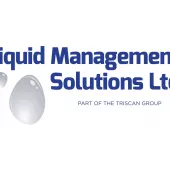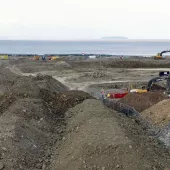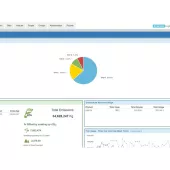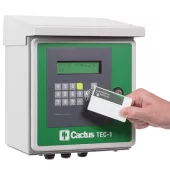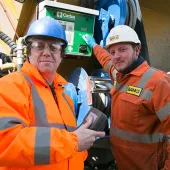Serious Fuel Management
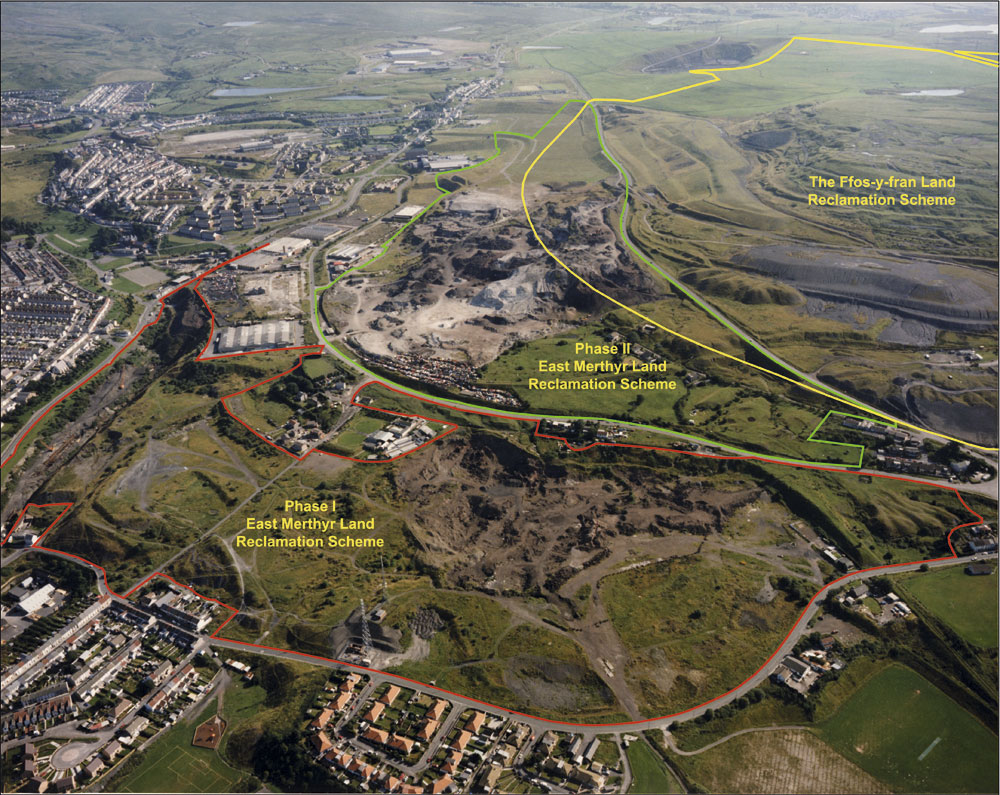
Miller Argent adopt RFid mobile solution at Ffos-y-fran
The Ffos-y-fran Land Reclamation Scheme is the third and final phase of the East Merthyr Reclamation Scheme that involves some 406ha of derelict land east of Merthyr Tydfil, in South Wales. Miller Group and Argent Group both became involved in Ffos-y-fran in 1996 as a result of discussions with local businessman and entrepreneur Bernard Llewellyn.
As a result, Miller Argent (South Wales) Ltd was formed in 2002 with the aim of taking forward the Ffos-y-fran Land Reclamation Scheme.
The East Merthyr Land Reclamation Scheme (EMLRS) was first conceived by the former Merthyr Tydfil Borough Council (MTBC) and the now defunct Mid Glamorgan County Council in the mid-1980s. It was established as a three-phase exercise to bring about the reclamation of a large area of derelict and dangerous land at minimal cost to the public purse. This was only made possible by the Council’s entering into agreements with British Coal allowing them to recover the underlying coals in return for them taking the responsibility for carrying out and paying for the reclamation works. The scheme was granted deemed planning consent in 1988, Phase I by Merthyr Tydfil Borough Council and Phases II and III by Mid Glamorgan County Council.
The EMLRS was the subject of extensive public consultation during its inception. The stated aim was to improve the environment of East Merthyr by reclaiming extensive tracts of derelict land, stabilizing the ground, introducing structural landscaping and, where appropriate, providing major infrastructure works to allow for future ‘built’ development. While the sites/phases were physically distinct and separated by highways, all three phases were interdependent in order to allow for the efficient dispersal of surface water run-off and to provide an integrated landscape restoration strategy.
Phases 1 and 2 of the EMLRS were completed during the period 1991–1997 and Merthyr Tydfil County Borough Council (MTCBC) received the Millennium Marquee Award (a unique environmental award) in recognition of the immense environmental improvement the scheme brought to the community.
Phase 3 was not started due to land ownership issues, though these were later resolved. Miller Argent own the rights to the majority of the land at Ffos-y-fran and, following discussions with the Council, submitted a completely new planning application for Phase 3, called the Ffos-y-fran Land Reclamation Scheme (FLRS).
The FLRS planning application was submitted in May 2003 and was ‘called in’ by the National Assembly for Wales for it to determine. The FLRS differed from the EMLRS in that the scheme fell entirely within the jurisdiction of MTCBC and provided for the reclamation of additional areas of derelict land and the recovery of additional coals which would otherwise have been sterilized.
The scheme was designed to ensure that the huge area of acute dereliction and associated dangers (due to the remnants of defunct deep mining for coal and iron ore; land instability; and historic over-tipping and unlawful waste tips) would be properly excavated, stabilized and, where appropriate, removed from site; with the land then being progressively restored for beneficial after-use.
A Planning Public Inquiry was held in September 2004. There were no objections from statutory consultees and Merthyr Tydfil County Borough Council voted to fully support the scheme. Objectors included the Merthyr Initiative Group and the Merthyr Anti-Opencast Campaign, together with a small number of local residents.
The scheme involves the excavation of approximately 125 million cubic metres of overburden and addresses a 2 million tonne deficit of soils. The scheme will facilitate the recovery of approximately 11 million tonnes of Welsh dry steam coal. Coaling must be completed within fifteen and a quarter years from the date of commencement, and the complete restoration works must be completed within seventeen and a half years from commencement, followed by a five-year period of aftercare.
Serious fuel management
In June 2007, Miller Argent (South West) Ltd signed a record-breaking deal with Finning UK for the supply of plant and support services worth £65 million. The deal represented the largest single-site plant and service contract ever to be signed in the UK. In total, 46 Caterpillar machines were purchased and delivered to the Ffos-y-fran Land Reclamation Scheme.
Obviously, with this amount of plant comes a necessary evil – a huge annual fuel spend to monitor and control.
Midlands-based fuel-management experts Liquid Management Solutions Ltd (LMS) took up the invitation and challenge to supply the prestigious long-term project with their proven radio frequency identification (RFid) solutions.
The lunar-like landscape and terrain of the Merthyr Tydfil site provided an immediate indication that any solution would have to be robust enough to withstand some of the most arduous external working conditions. Although LMS had already supplied numerous RFid systems into the UK quarrying industry, more in-depth technical discussions were required to fully understand the operational needs of the system at Ffos-y-fran. Due to the size and nature of the asset profile, Miller Argent had to be certain that LMS could meet the needs of their refuelling specification to achieve and accurately monitor dispensing rates of 600 litres/min.
The decision to invest in LMS’s RFid mobile solution was seen by management as offering a complementary function to Caterpillar’s existing telemetry hardware. The main objective of the LMS solution was to ensure that fuel was actually being dispensed into the correct asset and recorded within LMS’s weekly reporting.
Owing to the size of the operation, LMS engineers installed two bespoke mobile fuel-management terminals on two mobile tanker units, which were responsible for providing fuel to many of the items of plant. These special mobile terminals are designed, manufactured and fully certified to withstand vibration, blasts and external outdoor temperatures down to –40°C. Each mobile tanker was also specified with anti-spill, high-speed refuelling equipment to limit the risk of any environmental incidents.
Satisfying Miller Argent that every litre of fuel being dispensed on site could be securely and accurately captured, attention then focused on the user process of refuelling the fleet. The LMS RFid hardware was specifically designed with the user in mind, as it operates using contact-less technology, similar to the Oyster Card system that operates across London.
The user simply places the RF hand-held scanner in close proximity to an asset’s unique RFid tag, whereupon the terminal recognizes the asset and authorizes refuelling to take place in seconds. Each refuelling is then automatically captured and remotely communicated back to LMS’s servers.
‘At the outset, Miller Argent recognized that the days of pen and paper fuel monitoring and the dipping fuel tanks with sticks had long gone. With such high volumes of fuel being used, we were confident we could supply secure, visible capture of every litre of fuel being dispensed to both company and sub-contractor plant,’ said Kevin Taylor, managing director of LMS.
The final phase, working in conjunction with Miller Argent’s Environmental Policy, was to install highly accurate stainless steel tank probes into both of the 100,000-litre fuel storage tanks. LMS provided secure remote communications links, including leak-detection and temperature-compensation facilities, to regularly monitor and feed back fuel stock activities.
For further information on the range of fuel-management solutions offered by LMS, contact Kevin Taylor on tel: (01902) 421194; or email: ktaylor@liquidms.co.uk


